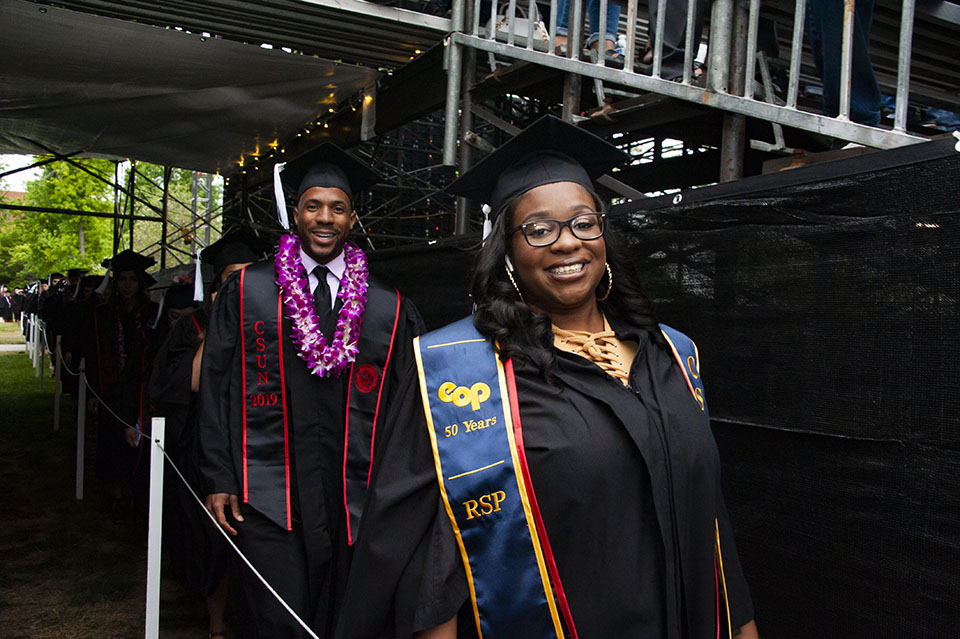CSUN Celebrates 50 Years of Lifting Up Students Through EOP

An EOP graduate processes to the Oviatt Lawn, at the Commencement ceremony for CSUN’s College of Social and Behavioral Sciences and the Michael D. Eisner College of Education, on May 18, 2019. Photo by Patricia Carrillo.
First in a series celebrating 50 Years of EOP at CSUN.
The Educational Opportunity Program (EOP) was founded at what was then San Fernando Valley State College in 1969 — the result of student activism during the civil rights movement and primarily peaceful protests against inequality and discrimination in higher education.
“It was a time of social unrest in the late ’60s, and there were a lot of students, faculty and staff who had the courage to start speaking up, finding their voice and sharing with others how they can make a difference,” said EOP Director Shiva Parsa, who has worked in the program since 1989. “It was happening statewide, but at Northridge it was a combination of students, faculty and some staff. They took a risk, jeopardizing their future, risking being beaten by the police, of being arrested.
“They were trailblazers, but also activists,” Parsa said. “Activism is about a cause. These individuals were already here — they weren’t on the outside trying to get in. They were on the inside, trying to open the doors of access for others. The way I see EOP is, it started as a movement, not a program. … Using solidarity and unity for a cause.”
In April 1969, in response to months of student protests, strikes and lobbying, California established EOP when state Sen. John Harmer sponsored and helped pass a bill that mandated and funded the program at five campuses, including Northridge.
“Students realized there was a contradiction between forces in higher education,” said longtime EOP Academic Liaison Glenn Omatsu, who is also a professor of Asian American studies. “On one hand, there was a force for inclusion, to make education more democratic, but on the other hand, there were the roots of exclusion — reserving higher education for only a few in society.”
With a Sept. 27 celebration on campus and a yearlong series of events, CSUN is marking 50 years of lifting up students through EOP — a milestone that cannot be overemphasized given the program’s stormy origins and the multiple times that students, faculty and alumni rallied to rescue it from the state budget chopping block.
EOP provides admission and academic assistance to eligible undergraduate students, including recruitment and counseling for high school students throughout the region. In many cases, the program offers financial assistance.
Now a statewide program, CSUN EOP was one of the CSU’s first and has grown into one of the largest and most respected programs in the nation.
“It occurs to me that what we do in EOP and higher education is incredibly important and continues to be the only thing that can sustain California as one of the better states in the country,” former director, pioneer and EOP alumnus Jose Luis Vargas ’74 (Sociology), M.A. ’75 (Educational Psychology and Counseling) said in 2014. Vargas died in March 2016.
With an average of 2,600 students each year, CSUN’s EOP has expanded dramatically since its beginnings in 1969 with just 90 students — one of whom was Vargas. The program stayed true to its mission to assist students from low-income, immigrant and educationally disadvantaged backgrounds, Vargas said.
“Historically, it has done everything it can to preserve the original intentions of the program … EOP at CSUN is visionary, accommodating and resilient,” Vargas said.
To celebrate EOP Month, staff and students also organized the annual, free EOP Month Celebration event on campus. This event is scheduled from 12 to 2:30 p.m. on Wednesday, Sept. 18, on Bayramian Lawn, adjacent to Etiwanda Avenue. The event is open to the entire campus community.
At CSUN, once admitted through EOP, students are eligible to enroll in a transition program to strengthen their math, reading or other skills. Students are placed within a community of mentors and receive counseling, tutoring and academic advisement.
Every summer, more than 500 first-time freshmen participate in EOP’s transitional programs: Residential Bridge, Commuter Bridge and FreshStart. In recent years, EOP staff also added two smaller programs for transfer students and second-year EOP students. Vargas also helped launch the Resilient Scholars Program, which provides support to former foster youth, and he was involved in the foundational work for CSUN’s Dream Center.
All the programs are free and include special orientation workshops or classes that expose the students to the demands of college, provide the tools they need to navigate those demands, develop support systems, and instill pride in the students’ rich heritage and appreciation for their diversity.
“The students who founded EOP and ethnic studies worked from the standpoint of opening up higher education for as many who wanted it as possible,” Omatsu said. “But the students realized it’s not enough to say there’s a policy of college education for all. You have to make it possible. The students fought for that, and that’s why we’re here today.”
The CSUN EOP 50th anniversary celebration is scheduled to take place on Friday, Sept. 27, at the Younes and Soraya Nazarian Center for the Performing Arts (The Soraya) on campus. Doors open at 6 p.m., program starts at 6:45 p.m. The event is free, and alumni are encouraged to attend. For more information or to RSVP by Sept. 20, visit http://www.surveymonkey.com/r/eop50event or http://www.csun.edu/eop

 experience
experience